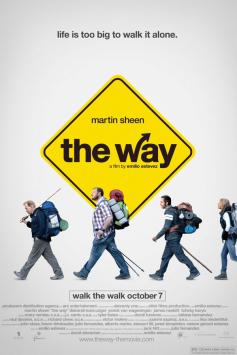The Way
Directed by Emilio Estevez (Arc Entertainment, 2011)
 If contemplation, as the mystic and spiritual writer William McNamara once said, is “a long, loving look at the real,” Emilio Estevez’s understated drama of loss, recovery, and reconciliation is a celebration of the ties that make a life worth the journey.
If contemplation, as the mystic and spiritual writer William McNamara once said, is “a long, loving look at the real,” Emilio Estevez’s understated drama of loss, recovery, and reconciliation is a celebration of the ties that make a life worth the journey.
Tom (Martin Sheen) is a California ophthalmologist whose 40-year-old son Daniel (Emilio Estevez) has died suddenly while making an 800-mile pilgrimage on the Camino de Santiago to the reputed burial place of St. James in Santiago de Compostela, Spain. Though he no longer thinks of himself as a religious person, the grieving father decides to complete his deceased son’s trek through hundreds of miles of mountainous Spanish countryside.
Along the way the reluctant Tom encounters and is begrudgingly attached to a motley band of other pilgrims. Joost, a chipper and chatty Dutchman, feels like an uninvited party guest who does not know when to leave. Sara, a morose Canadian divorcée, has an acerbic wit that becomes quickly tiresome. And Jack, a garrulous Irish writer without a gift for words, is certainly no Kerouac.
Each of these itinerant gadflies draws Tom out of his grief and back into an encounter with the life he had with his son and the life he will have now. His companionship with this imperfect menagerie of fractured souls provides him with some comfort and consolation in his grief, and offers him a communion of fellow pilgrims on this trek. As God once said of Adam, “It is not good for the creature to be alone.” So it must be good (and blessed) to be in the company of two or three others.
The Way is not explicitly religious, but it finds the glory of God seeping through the beauty of the Spanish countryside, discovers the touch of the divine in a shared meal with fellow travelers, and understands life as an ongoing pilgrimage made in the company of fellow sinners.
This article appeared in the January 2012 issue of U.S. Catholic (Vol. 77, No. 1, page 50).














Add comment